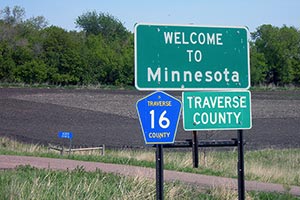Minnesota Lawmakers Agree Transportation is Key, Disagree on Funding

Minnesota's top leaders can agree transportation funding is key to helping the state and Greater Minnesota in particular. Yet legislative leaders and Gov. Mark Dayton can't decide how transportation should be funded, let alone other rural issues lawmakers should discuss during the upcoming legislative session.
Dayton joined legislative leaders Feb. 25 to discuss priorities heading into the 2016 session, which starts March 8.
While lawmakers agree transportation funding is a necessity, Republicans and Democrats differ on how best to fund it — Republicans want to set aside money from the state's general fund and other departments, while Democrats are pushing a gas tax as part of what lawmakers hope will be a comprehensive funding plan for the state's infrastructure for the next decade.
Dayton said he was pessimistic a transportation package could be put together if Republicans stuck to their position on shifting money from existing resources.
"There's no free lunch," he said. "It's going to come from somewhere. You can shift money from here to there, or whatever, but the question is to Minnesotans, 'Are you willing to pay, one way or the other, for what we need to get done, or are you just willing to live in a state where our highway infrastructure, roads and bridges continue to get worse?'"
House Speaker Kurt Daudt (R-Crown) said a transportation package is much more likely to succeed if both parties can pass legislation for areas they agree on, specifically funding for road and bridge maintenance and construction.
"We have the resources to pay for this," he said. "If we focus on what matters — roads and bridges — the funds are there."
At issue is whether lawmakers can agree on funding for at least $6 billion over the next 10 years, which the state estimates would be enough to maintain Minnesota's current transportation infrastructure.
In 2015, Republicans suggested allocating $7 billion toward transportation, while Dayton proposed an $11 billion package, which ran aground after lawmakers pushed back on the aforementioned gas tax.
Dayton suggested a potential cap on the gas tax could be set so Minnesotans wouldn't have to pay extra if gas returned to costing $3 or $4 per gallon.
Yet he urged lawmakers to act on more transportation funding, pointing out how projects can adversely affect businesses with few travel options like last year's Highway 14 detour in south-central Minnesota.
"You go to places like New Ulm, and businesses there, including trucking businesses, can't get onto Highway 14 to get their products to market," he said.
Aside from transportation, leaders have different ideas on how best to help rural Minnesotans.
Republicans are making tax relief for middle-class families one of their top priorities this session, in part due to a projected $1.2 billion surplus.
"We think the opportunity is right to look at the overall structure of our tax code," said Senate Minority Leader David Hann (R-Eden Prairie).
Yet Democrats hope to address several issues for Greater Minnesota this session, from a $45 million increase in local government aid to continued funding for broadband projects throughout the state.
Senate Majority Leader Tom Bakk (DFL-Cook) said Democrats would continue to support an increase in LGA, which would match state funding levels from 2002. The Senate proposed the same increase last year, but the issue died when lawmakers failed to pass a tax bill.
"The state needs to be a stronger partner with local units of government," he said.
Aside from transportation, Dayton has made education a priority this year. While some legislators have expressed concerns about addressing education during a shorter session, Dayton is pushing lawmakers to consider more funding for universal pre-kindergarten and efforts to reduce student debt for college graduates.
Democrats recently have introduced legislation that would increase state grants, freeze tuition and offer tax credits for college graduates paying off student loans.

